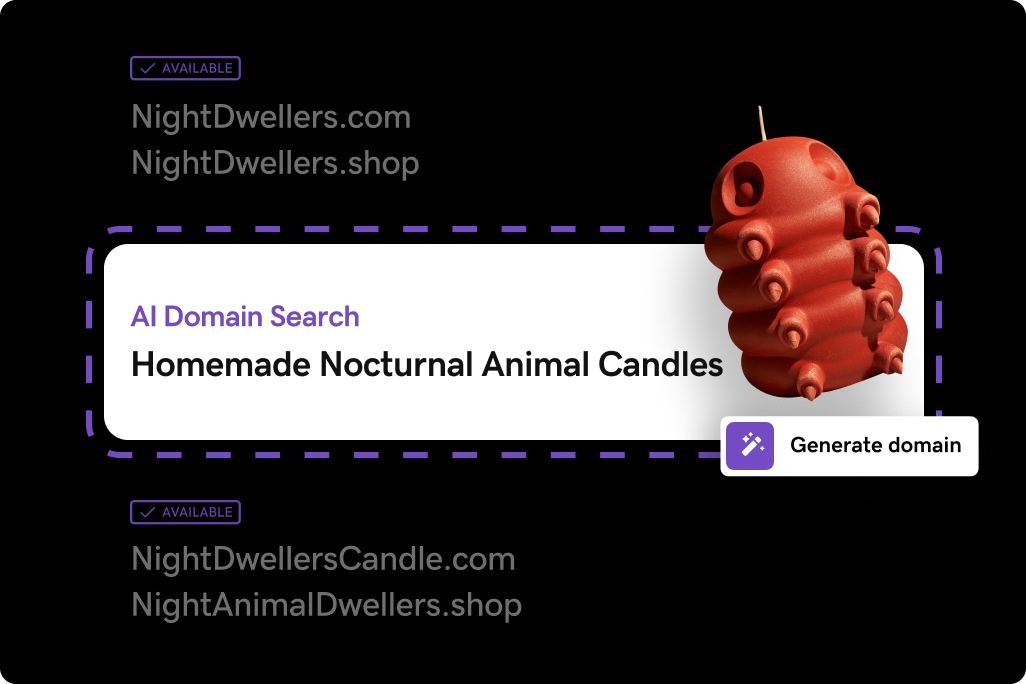When you’re hustling, time is money and that money comes in coins, not bills. It’s why we made our Website Terminology Glossary for web pros. This free resource for designers, developers, marketers or anyone else makes it easier explaining technical stuff to clients. Rather than a lengthy back-and-forth, use this glossary of domains terminology that breaks it down in real terms.
Start getting time back, and put more of those coins in the bank.
Website Terminology Glossary: Domains, Vol. 1
If you don’t keep things simple, explaining domain names to clients can quickly turn into an epic saga sweeping through the entire internet and its infrastructure. We recommend using the analogy of navigating the streets of a brick-and-mortar city.
DNS
The domain name system (DNS) links everything on the internet. It translates the random numerals and dots used in networking (an IP address) into easier-to-type domain names. A domain name’s DNS settings allow its use for things like websites and email.
It’s kinda like
If a domain name is like a street address, DNS is the city infrastructure: roads, power lines, water lines… all that. Do a WHOIS lookup search and check your domain’s public information.
You also might hear
domain name system, DNS settings, caching, records (e.g. A, CNAME)
Domain Name
Domain names use numerals, characters and hyphens to locate something online. Put together creatively, they can describe it as well. Domain names were created to simplify the random numerals and dots used previously in computing. A domain name is always registered for a set period of time, rather than owned outright.
It’s kinda like
A street address on the curb. If someone asked for directions, it’s easier to give a street address than coordinates for longitude and latitude. Just like a domain name.
You might also hear
domain, web address, URL
Domain Privacy
This service masks contact information in the public directory of everyone who registers domain names. Domain privacy may be automatically included in the price of registration, or sold separately.
It’s kinda like
If a domain is your address on the curb, domain privacy is like using an anonymous P.O. box instead, making it more challenging for people to access your personal information.
You might also hear
domain proxy
ICANN
Based in the United States, the Internet Corporation for Assigned Names and Numbers (ICANN) is a non-profit organization that sets rules and regulations for using a web address. Because ICANN also manages much of the infrastructure supporting the internet, it holds significant authority when it comes to stuff like using a certain web address.
It’s kinda like
Some communities maintain their appeal by establishing a homeowners association. Residents follow HOA rules because they want to stay in the community. ICANN is like an HOA for the internet.
You might also hear
internet corporation for assigned names and numbers
Registrant
An individual or organization that registers a web address for their exclusive use.
It’s kinda like
The resident of an apartment typically leases it, but still has exclusive rights for using the property. A registrant has similar rights with their domain name.
You might also hear
domain owner, website owner
Registrar
An accredited company managing the registration of website names, known as domain names.
It’s kinda like
The property manager of an apartment complex handles day-to-day transactions with residents on behalf of the owner. If registering a domain is like leasing an apartment, a registrar is like the property manager.
You might also hear
domain company, DNS registrar
Related: Check out our overview on the best domain registrars.
Registry
The entity that manages the database of registrations of a specific kind of web address.The registry governs all the rules and regulations for the address, and works with other organizations to sell them.
It’s kinda like
If domain registrations are like leases, and registrars like property managers, the registry is like the property owner.
You might also hear
registry operator, network information center (NIC)
Top-level domain (TLD)
In godaddy.com, everything to the right of godaddy is the TLD. Because there are more than 1,500 TLDs (.biz or even .ninja) with new ones added on a regular basis, opportunities always exist to get something unique. TLDs have guidelines for using them, but they’re generally available to anyone in the world.
It’s kinda like
If a domain name is like a street address, a TLD is the street. There can only be so many properties on a given street, so shoppers should scoop one up fast or look for a similar street.
You might also hear
extension, domain extension, domain ending
URL
The whole string in the address bar of a browser. In addition to a domain name like godaddy.com, a URL can include prefixes and suffixes like https:// and /.file.html. The uniform resource locator (URL) is also used outside the internet, for example, in internal networks.
It’s kinda like
If a domain name is like a street address, a URL is like an expanded address that might include county or province, and country code. For uses outside the internet, a URL is like a call number in the library or an inventory code for a machine part.
You might also hear
web address, internet address
WHOIS
This publicly searchable database includes the names and contact information of anyone who uses a web address. It’s often used by investors who wish to buy a domain from its registrant. Spammers can also target people with public WHOIS information. However, it’s possible to mask these details.
It’s kinda like
If a domain name is like a street address, WHOIS is like an old-school phone book. It’s nice for people to find you for legitimate reasons, but many times it’s better to go unlisted.
You might also hear
domainer, domain investor, domain privacy, domain proxy
Get yourself featured
Do you want to be featured on GoDaddy.com, show off your expertise to potential clients, connect with other web professionals, or get exclusive access to special GoDaddy projects and programs?
We'd love to have you as a GoDaddy Pro Community contributor! Get started here.
Love wasted time? (Neither do we.)
Fumbling for login credentials, running endless updates, explaining product purchases... No thanks. We built The Hub from GoDaddy Pro to save you an average three hours per month for every client site you maintain.







